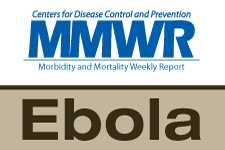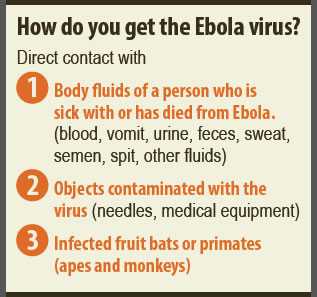Risk of Exposure

Ebola viruses are found in several African countries. Ebola was first discovered in 1976 near the Ebola River in what is now the Democratic Republic of the Congo. Since then, outbreaks of Ebola among humans have appeared sporadically in Africa.
Risk
Healthcare providers caring for Ebola patients and family and friends in close contact with Ebola patients are at the highest risk of getting sick because they may come in contact with infected blood or body fluids. Ebola also can be spread through direct contact with objects (like clothes, bedding, needles, syringes/sharps or medical equipment) that have been contaminated with infected body fluids. Additionally, people can become sick with Ebola after coming in contact with infected wildlife. For example, in Africa, Ebola may spread as a result of handling bushmeat (wild animals hunted for food) and contact with infected bats.
It is also possible that Ebola could be spread through sex or other contact with semen from men who have survived Ebola. Until more information is known, avoid contact with semen from a man who has had Ebola. It is not known if Ebola can be spread through sex or other contact with vaginal fluids from a woman who has had Ebola.
CDC and other public health partners are continuing to study Ebola transmission and will share what is known as it becomes available.
Past Ebola Outbreaks
Past Ebola outbreaks have occurred in the following countries:
- Democratic Republic of the Congo (DRC)
- Gabon
- South Sudan
- Ivory Coast
- Uganda
- Republic of the Congo (ROC)
- South Africa (imported)
2014 Ebola Outbreak in West Africa
The 2014 Ebola epidemic has been the largest in history and has affected multiple countries in West Africa. Two imported cases, including one death, and two locally acquired cases in healthcare workers were reported in the United States.
- Page last reviewed: December 9, 2015
- Page last updated: December 9, 2015
- Content source:




 ShareCompartir
ShareCompartir
